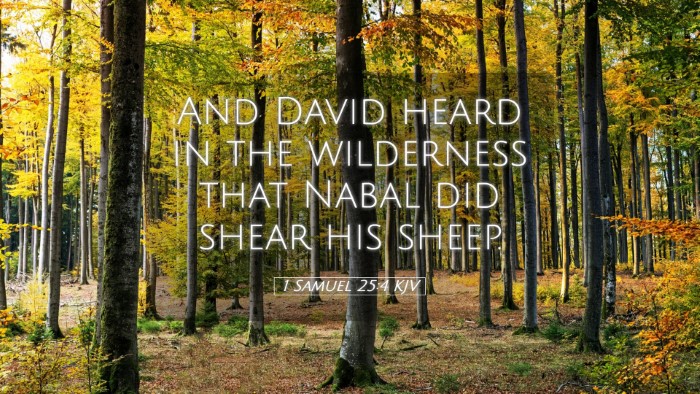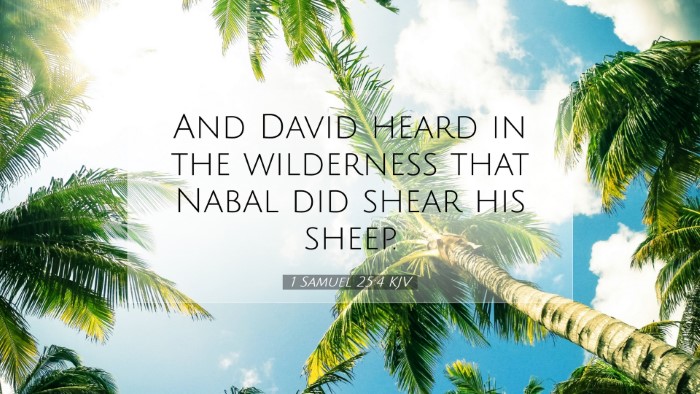Commentary on 1 Samuel 25:4
Verse Text: "And when David heard in the wilderness that Nabal did shear his sheep," (1 Samuel 25:4, KJV)
Introduction
The context of 1 Samuel 25:4 provides a profound glimpse into the character dynamics at play between David and Nabal. This passage marks a pivotal moment that bridges personal conduct with broader themes of divine justice and leadership. In examining this verse, we can draw from several public domain commentaries to enrich our understanding.
Contextual Background
- The Setting: This event occurs while David is in the wilderness, a time when he is both a fugitive and a leader to his followers. His experience reflects the challenges faced during times of transition.
- Nabal's Shearing Season: The shearing of sheep was a time of celebration and prosperity. Nabal’s actions could be interpreted as indicators of wealth and an opportunity for generosity.
Insights from Commentaries
Matthew Henry's Commentary
Matthew Henry emphasizes the moral lessons presented in the encounter between David and Nabal. Henry notes that the shearing season invites reflection on the social conventions of hospitality and generosity. He remarks:
“This shearing time is an opportunity for kindliness, and David, aware of Nabal's wealth, hopes to receive hospitality, which is due during such a time of abundance.”
Henry also observes that David's request for assistance was reasonable, considering Nabal's background. The expectation for something in return for the protection David provided is underscored as a critical aspect of leadership and community relationships.
Albert Barnes' Notes
Albert Barnes adds a keen perspective on David’s leadership qualities by examining his motives for approaching Nabal. He suggests:
“David's inquiry is not merely for material gain, but rather a call to recognize a moral obligation intrinsic in community life.”
Barnes elaborates on the cultural expectations placed upon individuals during significant events, indicating that David’s approach is not only justified but speaks to a deeper understanding of social duty amidst communal life.
Adam Clarke's Commentary
Adam Clarke delves into the implications of David's decision to reach out to Nabal during this significant moment. He notes the tension that arises from Nabal's character and the eventual refusal to comply with David’s request. Clarke asserts:
“This narrative unveils not merely a refusal, but an insight into the dishonorable disposition of Nabal, contrasting sharply with David’s noble intentions.”
Clarke emphasizes that the sociopolitical landscape of the time plays an essential role in understanding Nabal’s lack of hospitality and goodwill.
Theological Reflections
In the broader theological context, 1 Samuel 25:4 invites readers to assess the nature of relationships built on duty, respect, and the natural expectation of reciprocity. The scripture serves as a reminder that interactions within the community should reflect both compassion and integrity.
Practical Applications
- Leadership Lessons: David exemplifies a leader who remains poised and dignified in the face of discouragement, which serves as a model for contemporary leaders.
- Community Ethics: The text challenges readers to analyze their obligations toward others, especially when circumstances highlight a need for generosity.
- Character Assessment: Nabal’s response serves as an exploration of character under stress: a reminder of how wealth should not eclipse moral obligations.
Conclusion
1 Samuel 25:4 encapsulates multifaceted themes that resonate beyond the historical narrative. The contrasts between David's expectations and Nabal's response serve to highlight both personal and communal dimensions of ethical living, justice, and leadership. Readers and scholars are invited to reflect on these dimensions, not only as historical insights but as ongoing lessons for faith communities today.


